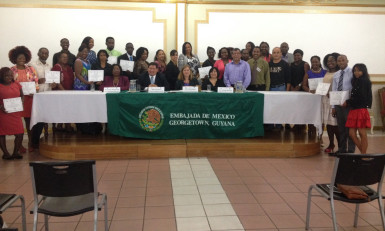Twenty-nine teachers from across the Caribbean on Friday completed the Spanish as a second language workshop which was facilitated by Caricom and the Mexican government.
The training is part of the VI Mexico-Caricom Cooperation Programme 2014-15 which facilitates social development and is geared at improving the teaching of Spanish among the member states of the Caribbean Community. The intermediate training course lasted for a period of two weeks, beginning on December 7, and saw the participation of teachers from 12 countries across the Caribbean.
The training was conducted by Professor Elin Emilsson and Dr Victoria Villasenor of Mexico’s National Pedagogic University. They were tasked with delivering lessons intended to provide teachers with modern tools and create a forum where they can discuss creative and productive solutions to everyday problems faced by teachers.
Speaking at Friday’s event, Director of Foreign Policy and Community Relations at the Caricom Secretariat Valerie Alleyne-Odle expressed gratitude to the Mexican government for the role it continues to play in programmes of this kind since language training has proven to be an initiative of great importance for the Caribbean community.

She said, “In today’s rapidly changing and globalized world, it is imperative that we continue to strengthen the language teaching capacity of our professors in the region, ensuring that students are well trained and able to face the requirements of the world’s multilingual context.”
Odle acknowledged the workshop to be one which has offered Spanish teachers throughout the region the opportunity to further mould their language skills. She said this would improve instructions for their students in an area that is of an increasing importance to regional development in the 21st century.
“For the Caribbean Community… surrounded by a large body of Spanish speakers, the need for proficiency in Spanish has become even more critical as the region continues to foster greater socio-culture, political, and economic partnerships with its economic weavers,” she explained.
Odle further stated that based on the world population and economic trends, Chinese, Hindi, English and Spanish will be the most widely used languages of international trade in the future. Therefore, strategic action is needed to promote multilingual wisdom at all levels.
“Regional and international development and the emergence of the global economy and society have rendered the acquisition of multilingual skills as imperative for success,” the woman added.
And while the region has embarked on several initiatives to enhance the teaching of Spanish in particular from the earliest levels, Odle acknowledged the Government of Mexico as having been a significant partner in facilitating the training of Caricom teachers in the application of new methodologies.
“…This workshop has assisted the teacher in recognizing the importance of creating a learner who is… enthusiastic, ready to explore and ultimately become professional in Spanish,” Odle stated.
Teachers would have also benefited from being able to consider interesting and resourceful ways of enhancing the teaching and learning environment including the use of embassies and consulates as readily open resources.
According to Professor Emilsson, the workshop also afforded them the opportunity to leave with a deep sense of respect and understanding for the countries of the Caribbean. She said, “We have learnt so much about history, geography, foods, as well as cultures of the Caribbean and we can now enjoy them respectively.”
Meanwhile, Mexican Ambassador Ivan Sierra, emphasized the importance of the programme, explaining that its objective is to promote the integration of Caribbean countries and Latin America. He noted that since Spanish is the second most used language of international communication in the world, his government remains committed to offering the necessary support to building capacity for Spanish.
For 19-year-old Indira Ally, a very recent graduate of the Cyril Potter College of Education, the programme allowed her to assess new ways of lesson application in the classroom. “It has only been four months since I began teaching and this programme has helped me with new ideas of how I can put over my work to my students,” Ally stated.
Similar sentiments were shared by Cameron Foster of St Vincent and the Grenadines and Felicia Miller from the Bahamas. Foster said, “It’s such a wonderful programme because sometimes, we as teachers just teach straight to the students. But this programme has opened our eyes to the different ways in which we can teach Spanish as a second language. When I get back home, I’m definitely going to utilize the methods I learnt here.”
“Overall, it was very informative, with the different methods presented and what I have learnt from the other teachers as well. I can take those things and implement them in my own classroom back home,” Miller related.
Participants in the training activities had the opportunity to learn about intercultural competencies and methodological aspects of teaching Spanish as a second language. The course also included a series of activities to familiarize participants with Mexican literature and culture as well as the opportunity to take part in extra-curricular activities aimed at getting them immersed in the Spanish language.
This is the second phase of a three-part series aimed at enhancing the manner in which Spanish as a second language is being taught in the region. Teachers were also drawn from Antigua and Barbuda, Barbados, Belize, Dominica, Grenada, Jamaica, St Lucia, St Kitts and Suriname.









